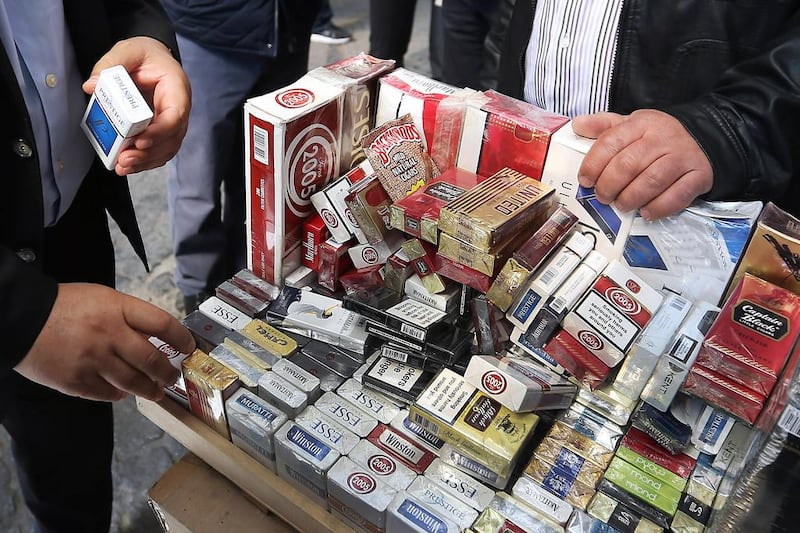Hunched over a polystyrene crate with a cup of coffee perched on it, the man, at first glance, appears to be enjoying his refreshment while watching the bustle of market life.
Then, someone approaches, the cup is swiftly removed and the lid lifted on the crate to reveal dozens of cigarette packs of various brands stuffed inside. An exchange of cash for tobacco takes place. This is Turkey’s illicit cigarette trade.
The illegal transaction in Istanbul’s Fatih market district is common in a country where the government is estimated to have lost about US$9.5 billion in tax revenue from cigarette smuggling in the past five years. Demand for black-market cigarettes has ballooned since the prime minister Recep Tayyip Erdogan in January 2010 increased the tobacco excise by 30 per cent. Mr Erdogan — who has labelled tobacco as more dangerous than terrorism — has raised the excise every year since. More than a quarter of Turkey’s 76.7 million people are believed to be smokers.
The tobacco industry says the sudden excise spike has hastened the popularity of cheap, often illegal, cigarettes, rather than dampened smoking. Illicit trade rose to 16.2 billion cigarettes last year from 3.9 billion in 2007.
From his cluttered office overlooking the comings and going on the Bosphorus, Mehmet Eryilmaz is on the front line of Turkey’s battle against illicit trade. Surrounded by stacks of dusty papers and black plastic bags filled with cigarettes, counterfeit and genuine, seized from Istanbul’s port, the senior Turkish customs officer estimates that he and his colleagues have seized about $2bn in contraband cigarettes in the past year.
“There is a growing trend for illicit cigarettes as demand for cheap cigarettes is high,” he says. “There is a lot we can doing to fight it but it is impossible to eradicate completely as profits are very high.”
Straddling the boundaries between Europe and Asia, Turkey is a natural gateway for contraband goods flowing between the regions. But the country’s introduction of tobacco rules that British American Tobacco calls the world’s fourth-toughest has bolstered its attraction for cigarette smugglers.
Tobacco industry officials say Turkey serves as a cautionary tale as they warn governments in the UAE and elsewhere in the GCC against any similar sudden excise jump. At present, tobacco taxes in the GCC are among the lowest in the world, ranging from 20 per cent to 40 per cent across different price brands.
GCC finance ministers as recently as last year discussed the possibility of doubling the duty.
“We support sensible and gradual tax increases that do not destabilise the legal market,” says Wael Ismail, the area regulatory affairs manager in the Middle East at BAT, the world’s second biggest tobacco maker.
“While some smokers may choose to quit or smoke less, evidence shows that large and sudden tax rises do not always result in reduced overall tobacco consumption.”
Mr Ismail estimates the global tobacco industry loses around $10bn annually through contraband and counterfeit cigarettes. It also claims the funds from black market tobacco can sometimes fund crime, including drug trafficking and terrorist activities.
In the UAE, BAT is afraid of its 24 per cent market share being further eroded by illicit cigarettes, which already make up 30 per cent of sales, according to the company.
The UAE, and more specifically Dubai, have already been highlighted as potential weak links in the illicit tobacco supply chain. According to a report by the European Commission’s Taxation and Customs Union, 56 per cent of illegal cigarettes seized in Europe in 2010 were made in the UAE.
BAT estimates that the UAE has 18 cigarette factories, many of which are based in the Jebel Ali free-trade zone, attached to one of the Middle East’s busiest shipping ports.
In the past, customs officials have closed factories found to be producing counterfeit cigarettes that infringe on the trademark rights of legitimate brands. But even where genuine products are made there can still be illegal acts.
BAT alleges that genuine cigarettes can sometimes be sold to smugglers, who ship the tobacco to other countries with the aim of evading import tax and sales duties. Saeed Al Tayer, the director of Jebel Ali Custom Centers, says Dubai was taking considerable steps to crack down on the illicit cigarette trade.
“We have a modern x-ray system that can read the container number and integrate with the custom declaration form to match the description of the goods on the form with what is inside the container,” he says.
Officials also relied on the experience of customs officials to monitor traders’ body language, as well as teams of sniffer dogs, he adds.
But one of the challenges Dubai officials face is that Jebel Ali is often targeted by smugglers seeking to take advantage of the port’s huge size to evade detection.
A federal law that came into effect this year has outlawed tobacco production in the UAE and has given existing manufacturers a 10 year grace period to comply.
Mr Eryilmaz, the Turkish customs officer, says Jebel Ali is a frequent transit point for cigarettes smuggled into Turkey via an elaborate trade route starting in Bulgaria.
Produced by a company called Bulgartabac — which has an office in Dubai — so-called “cheap whites” are shipped by smugglers from Bulgaria with packaging and paperwork appropriate for their nominal final destination of Iraq, he said.
They are shipped through the Suez Canal and Red Sea, around the Gulf of Aden and up to Jebel Ali, the transit point. Once there, the tobacco is usually disguised as another product and given fresh paperwork before being shipped onwards to Iraq, where it is smuggled back across the border into Turkey without paying excise duty.
Mr Eryilmaz cites the example of cigarettes being hidden under stacks of tea trays or prayer mats.
“Our staff try their best but cigarette smugglers become more imaginative,” he says. “That makes it difficult.”
No one from Bulgartabac was available for comment.
tarnold@thenational.ae
Follow us on Twitter @Ind_Insights





